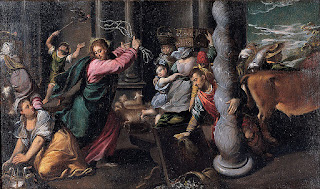Psalms of Anger
Today's Daily Office readings included Psalm 109. I found it interesting that in my daily prayer app (https://apps.apple.com/us/app/mission-st-clare/id445186741), the following section was in parenthesis, as if to say "you can omit this part if it makes you more comfortable":
Psalm 109:5-19
" Set a wicked man against him, and let an accuser stand at his right hand.
When he is judged, let him be found guilty, and let his appeal be in vain.
Let his days be few, and let another take his office.
Let his children be fatherless, and his wife become a widow.
Let his children be waifs and beggars, let them be driven from the ruins of their homes.
Let the creditor seize everything he has; let strangers plunder his gains.
Let there be no one to show him kindness, and none to pity his fatherless children.
Let his descendants be destroyed, and his name be blotted out in the next generation.
Let the wickedness of his fathers be remembered before the LORD, and his mother's sin not be blotted out;
Let their sin be always before the LORD; but let him root out their names from the earth;
Because he did not remember to show mercy, but persecuted the poor and needy and sought to kill the brokenhearted.
He loved cursing, let it come upon him; he took no delight in blessing, let it depart from him.
He put on cursing like a garment, let it soak into his body like water and into his bones like oil;
Let it be to him like the cloak which he wraps around himself, and like the belt that he wears continually.
Let this be the recompense from the LORD to my accusers, and to those who speak evil against me."
Wow. Yes, that is in the Bible. And it's understandable that the Daily Office app might give you the option to skip it. Can you imagine reading this in church?
But here's the thing: I couldn't help but have someone in mind when I was reading that section. A leader of a nation who has indeed neglected to show mercy, and has persecuted the poor and needy. Someone who has delighted in cursing rather than blessing, and someone who many hope will be removed from his position of power "and let another take his office". Can you guess who I'm thinking of?
Who wouldn't look at the actions of a merciless tyrant and think some of these same thoughts that the psalmist has recorded?
It's interesting to me how we have a problem with the parts of the Bible that are not warm and fuzzy, and we try to ignore them or rationalize them so that we feel better about their existence. We remember the parts about loving our neighbors and our enemies, but the parts where anger or other strong negative emotions are expressed tend to not be our go-to verses. Maybe we're doing ourselves and the scriptures a disservice by glossing over those parts.
Jesus may have told us to love our enemies, and to bless those who curse us, but that doesn't change the fact that he got angry on several occasions. His anger usually erupted over those who were perpetrating injustice. (He does seem to get angry with his disciples a few times, but it seems more like irritation than righteous anger).
Our God cares about justice, and so do we. We get angry when we see people who do evil things get away with them. This is expressed in several of the psalms, not just the one from today, and in many other places in the Bible as well. But isn't "anger" one of the seven deadly sins? Well, not quite.
"Wrath" is the deadly sin that is associated with anger. People have mistakenly labeled the emotion anger, which all people have at one time or another, as sinful. But wrath is about carrying a normal emotion to extremes. Dorothy L Sayers defined wrath as "love of justice perverted to revenge and spite." Jesus' anger did not propel him into acts of revenge or spite. When he cleansed the temple, he did not do violence against people, but against money and goods.
So what about praying that God will smite your enemy? It's true that "vengeance is mine, I will repay, says the Lord". But if we get caught up in asking God to do these things, we are holding that anger in our hearts instead of allowing it to rise and fall naturally. We can turn anger into wrath by clinging to it. However, that doesn't mean we should suppress it either.
Emotions are valid. They are part of the human condition. Allow yourself to feel what you are feeling. When I talked to my spiritual director about feelings of anger in prayer one time, she asked me to think about what God might be inviting me into by these feelings. It changed my perspective, because I had been feeling guilty for having anger in prayer at all. I had felt as though anger was a distraction from praying to God, but now I look at it as another avenue into communicating with the divine. Your anger can be used for good. Righteous anger has fueled revolutions.
"Be angry but do not sin; do not let the sun go down on your anger, and do not make room for the devil... Let no evil talk come out of your mouths, but only what is useful for building up, as there is need, so that your words may give grace to those who hear." ~ Ephesians 4:26-27, 29
Psalm 109:5-19
" Set a wicked man against him, and let an accuser stand at his right hand.
When he is judged, let him be found guilty, and let his appeal be in vain.
Let his days be few, and let another take his office.
Let his children be fatherless, and his wife become a widow.
Let his children be waifs and beggars, let them be driven from the ruins of their homes.
Let the creditor seize everything he has; let strangers plunder his gains.
Let there be no one to show him kindness, and none to pity his fatherless children.
Let his descendants be destroyed, and his name be blotted out in the next generation.
Let the wickedness of his fathers be remembered before the LORD, and his mother's sin not be blotted out;
Let their sin be always before the LORD; but let him root out their names from the earth;
Because he did not remember to show mercy, but persecuted the poor and needy and sought to kill the brokenhearted.
He loved cursing, let it come upon him; he took no delight in blessing, let it depart from him.
He put on cursing like a garment, let it soak into his body like water and into his bones like oil;
Let it be to him like the cloak which he wraps around himself, and like the belt that he wears continually.
Let this be the recompense from the LORD to my accusers, and to those who speak evil against me."
Wow. Yes, that is in the Bible. And it's understandable that the Daily Office app might give you the option to skip it. Can you imagine reading this in church?
But here's the thing: I couldn't help but have someone in mind when I was reading that section. A leader of a nation who has indeed neglected to show mercy, and has persecuted the poor and needy. Someone who has delighted in cursing rather than blessing, and someone who many hope will be removed from his position of power "and let another take his office". Can you guess who I'm thinking of?
Who wouldn't look at the actions of a merciless tyrant and think some of these same thoughts that the psalmist has recorded?
It's interesting to me how we have a problem with the parts of the Bible that are not warm and fuzzy, and we try to ignore them or rationalize them so that we feel better about their existence. We remember the parts about loving our neighbors and our enemies, but the parts where anger or other strong negative emotions are expressed tend to not be our go-to verses. Maybe we're doing ourselves and the scriptures a disservice by glossing over those parts.
Jesus may have told us to love our enemies, and to bless those who curse us, but that doesn't change the fact that he got angry on several occasions. His anger usually erupted over those who were perpetrating injustice. (He does seem to get angry with his disciples a few times, but it seems more like irritation than righteous anger).
"Driving of the Merchants from the Temple", Scarsellino (1550-1620)
Since Jesus was without sin, it would stand to reason that anger (as an emotion) is not a sin. But we often treat it like one.
I know I've had an issue when it comes to anger. Not that I need "anger management", but rather that I need to give myself permission to be angry. I'm sure being female has something to do with it; women are socialized to not express anger openly. But it's also in the Christian culture to be "meek and mild". If someone is abusing you, you're supposed to stand there and take it, like Jesus stood and let the Roman soldiers scourge and mock him. "Turn the other cheek." But the example of Jesus getting angry and expressing that is rarely held up.
Our God cares about justice, and so do we. We get angry when we see people who do evil things get away with them. This is expressed in several of the psalms, not just the one from today, and in many other places in the Bible as well. But isn't "anger" one of the seven deadly sins? Well, not quite.
"Wrath" is the deadly sin that is associated with anger. People have mistakenly labeled the emotion anger, which all people have at one time or another, as sinful. But wrath is about carrying a normal emotion to extremes. Dorothy L Sayers defined wrath as "love of justice perverted to revenge and spite." Jesus' anger did not propel him into acts of revenge or spite. When he cleansed the temple, he did not do violence against people, but against money and goods.
So what about praying that God will smite your enemy? It's true that "vengeance is mine, I will repay, says the Lord". But if we get caught up in asking God to do these things, we are holding that anger in our hearts instead of allowing it to rise and fall naturally. We can turn anger into wrath by clinging to it. However, that doesn't mean we should suppress it either.
Emotions are valid. They are part of the human condition. Allow yourself to feel what you are feeling. When I talked to my spiritual director about feelings of anger in prayer one time, she asked me to think about what God might be inviting me into by these feelings. It changed my perspective, because I had been feeling guilty for having anger in prayer at all. I had felt as though anger was a distraction from praying to God, but now I look at it as another avenue into communicating with the divine. Your anger can be used for good. Righteous anger has fueled revolutions.
"Be angry but do not sin; do not let the sun go down on your anger, and do not make room for the devil... Let no evil talk come out of your mouths, but only what is useful for building up, as there is need, so that your words may give grace to those who hear." ~ Ephesians 4:26-27, 29



Comments
Post a Comment